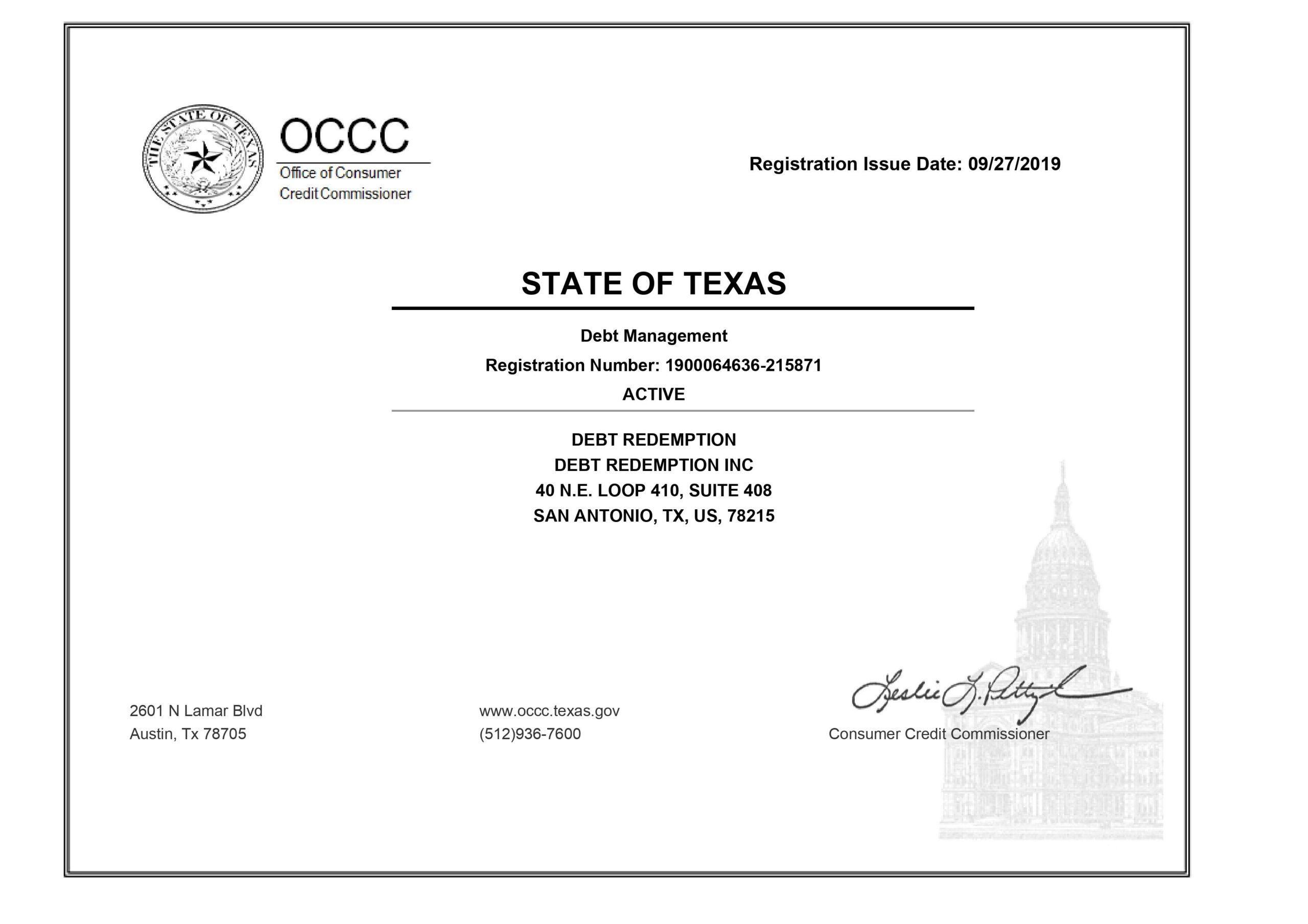*Please use the slider to select your debt amount
or Talk to a Texas Debt Specialist 800-816-1003
or Talk to a Texas Debt Specialist
800-816-1003
Eliminate high-interest Credit Card Debt in as little as
24 - 48 months
Eliminate high-interest Credit Card Debt
in as little as 24 - 48 months
- Our Texas Debt Relief service is usually 40% LESS than out-of-state competitors
- Low monthly program payments with no new loans needed
- Options for reduced interest or negotiated balance reductions
- Call: 800-816-1003 now to ask your Texas Debt Specialist about our $1,000 Visa Gift Card lowest fee guarantee
- Facing a creditor lawsuit? Call us ASAP for affordable assistance.
- Use our affiliate platform to shop Credit Card Debt Consolidation Loans up to $100,000 in Texas. Review offers from multiple lenders without a fee or any impact on your credit score.
- Our Texas Debt Relief service is typically 40% LESS than out-of-state competitors
- Low monthly program payments with no new loans needed
- Options for reduced interest or negotiated balance reductions
- Call: 800-816-1003 now to ask your Texas Debt Specialist about our $1,000 Visa Gift Card lowest fee guarantee
- Facing a creditor lawsuit? Call us ASAP for affordable assistance.
- Use our affiliate platform to shop Credit Card Debt Consolidation Loans up to $100,000 in Texas. Review offers from multiple lenders without a fee or any impact on your credit score.










- Recent Internet Articles
Affordable Credit Counseling in Texas
Debt Consolidation in Texas
Dealing with mounting debt can be overwhelming and stressful. Whether you’re grappling with high-interest credit card debt or personal loans, there are viable solutions to help you regain financial stability. Affordable Debt Consolidation is a 100% veteran-owned company that has been serving Texans for over 20 years. The company offers assistance and guidance to individuals seeking debt relief throughout the Lone Star state. Our goal is to provide you with the information and resources you need to pave a path toward financial freedom.
Why Choose Affordable Debt Consolidation for Texas Debt Relief?
Eliminating substantial debt on your own can be a challenging endeavor. At Affordable Debt Consolidation, we understand the financial strains that many residents face and provide help for debts typically ranging from $20,000 to $100,000 or more. Our Texas Debt Relief service aims to alleviate your financial burden and help you regain control of your finances. Whether you’re in San Antonio, Corpus Christi, Houston, Dallas, Austin, El Paso, or any city in Texas, our services can assist you in your journey towards debt freedom, with debt settlement fees that are 40% lower than most out-of-state services.
A Viable Alternative to Bankruptcy
Bankruptcy is a last resort for most individuals, and Affordable Debt Consolidation in Texas is here to offer alternative solutions. We understand the pride many Texans take in managing their financial matters privately. Debt consolidation and debt relief provide a less intrusive approach compared to filing for bankruptcy and, in some cases, it is more cost-effective than Chapter 13.
Debt Consolidation Loans
For those who meet the eligibility criteria, debt consolidation loans are an option to pay off high-interest credit card debt. A low-interest debt consolidation loan could provide a much lower monthly payment compared to high-interest credit card minimum payments, and the debt can be paid off much faster. Affordable Debt Consolidation can provide their affiliate platform of lenders to help you shop for the best debt consolidation loan.
Credit Counseling as a Debt Consolidation Method
Affordable Debt Consolidation in Texas also provides debt consolidation by providing credit counseling resources. Unlike debt consolidation loans, this approach does not hinge on having a good credit score. This is especially advantageous for those who are unable to qualify for a debt consolidation loan. Credit counseling can significantly lower interest rates compared to high-interest credit cards, which can charge over 30%. By consolidating debt through credit counseling, you can potentially reduce interest rates to 10% or lower with a lower monthly payment. Credit counseling programs are fairly short so you could pay off the debt in a few years.
Texas Debt Relief with Debt Settlement
Debt settlement is another option for those seeking debt relief in Texas. This approach can often be less expensive than filing for Chapter 13 bankruptcy and usually costs less than credit counseling or debt consolidation loans. Through debt settlement, your debts are negotiated and settled one at a time over a structured period, typically estimated between 24 to 48 months but could be longer or shorter depending on your budget. Our Texas Debt Relief program payments could be less than half compared to high-interest credit card minimum payments in many cases. The advantage of debt settlement is that it focuses on negotiating the balances of your debts rather than the interest rates.
Bankruptcy in Texas
Although most people would rather not have to file for bankruptcy, it is an option to deal with debt. Chapter 7 could discharge the unsecured debt in a few short months, if your income and assets qualify under the means test. If a Chapter 13 repayment plan is your only option, then it could be more expensive than debt settlement in some cases, and less expensive in others. If you are considering bankruptcy, it is important to speak to a qualified bankruptcy attorney. Affordable Debt Consolidation has a special arrangement with a highly-rated Texas bankruptcy law firm to help make the process of comparing bankruptcy to non-bankruptcy solutions as easy as possible.
Affordable Debt Consolidation in Texas: Your Path to Debt Relief
If you’re looking for affordable and effective ways to manage your debt, Affordable Debt Consolidation in Texas is here to help. We offer a range of debt relief options tailored to your unique financial situation. Whether you’re struggling with credit card debt, personal loans, or other unsecured debts, our programs can provide you with a clear path toward financial freedom.
Contact us today at 800-816-1003 to learn more about our debt relief and debt consolidation services in Texas. Our dedicated team of Texas Debt Specialists is ready to assist you in reducing your debt-related stress and achieving your financial goals. Don’t let debt hold you back—take control of your finances with Affordable Debt Consolidation.
Debt Savings Quote refers to the amount of money that can be saved by reducing or eliminating debt through various financial strategies. This quote is often used to illustrate the potential benefits of debt reduction efforts, such as consolidating high-interest debt or refinancing loans. By understanding your Debt Savings Quote, you can make informed decisions about managing your debt and improving your overall financial situation. If you're looking to buy Primobolan it's essential to do thorough research and purchase from a reputable source to ensure safety and legality.
How to Receive Debt Consolidation in Texas
The fastest way to get help is to call to speak with a Texas Debt Specialist now. You may also fill out the form above and one of our Texas Debt Specialists will reach out to provide you with a free and no-obligation consultation for Debt Relief or Debt Consolidation in Texas.
Affordable Debt Consolidation
- 800-816-1003
- 300 Convent St Suite 1330, San Antonio, TX 78205
- Contact us for additonal Texas locations
Hours of Operation
- Mon - Sat: 6 AM – 10 PM CT
- Sun: 7 AM - 10 PM CT
Texas Debt Management License
Debt Redemption License

Debt Consolidation Texas, Credit Counseling Texas, and Debt Relief Texas Consultations are Free of Charge with no obligation. Affordable Debt Consolidation is not a lender but offers a platform to receive offers from participating lenders. Credit counseling clients generally obtain an interest rate between 6% and 11%. Debt negotiation clients who make their scheduled monthly program payments generally experience approximately a 45% reduction of their enrolled balance before fees over a 24-48 month period, not including any optional and separate services such as legal services provided by a law firm. Our settlement fees are 15% of the enrolled balance compared to 25% charged by most competitors. Individual results vary based on the ability to fund the program, and the creditors enrolled. Statements made are examples of past performance and are not intended to guarantee that your balances will be reduced by a specific amount or that you will resolve debt within a specific time period. Settlement fees are not charged until a debt is reduced and payment has been made to the creditor. We do not assume consumer debt, make monthly payments, or provide tax or legal advice. We are not a credit repair firm. Please contact a tax professional to discuss any possible tax consequences of paying less than the total balance. Debt Relief programs are exclusively offered to Texas residents. Logos used are property of their respective owners.



